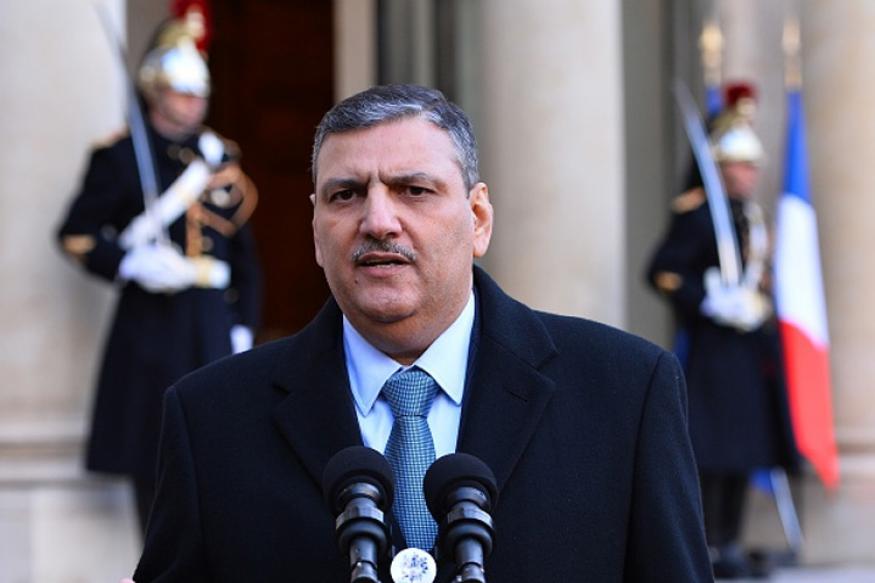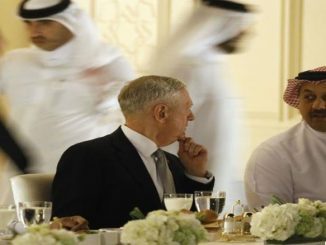
Syria’s chief opposition coordinator Riad Hijab said on Tuesday that international efforts to achieve a ceasefire in Syria’s civil war were doomed without any credible mechanism to designate blame or attribute consequences.
Hijab, once a prime minister under Syrian President Bashar al-Assad, said in an interview that the failings in the ceasefire deal brokered by the United States and Russia were flawed from the outset.
“We have no faith in the Russian side because their strategy is purely military,” Hijab, who presides over the High Negotiations Committee of opponents of Assad, told Reuters on the sidelines of the annual United Nations General Assembly.
Assad regime’s military on Monday declared that the seven-day ceasefire was over and accused the rebels of breaching the ceasefire and using it to strengthen their positions.
The ceasefire was shattered, and the United Nations suspended all aid shipments into Syria, after a deadly attack on a convoy carrying humanitarian supplies to a town near Aleppo on Monday, and civilian areas were heavily bombed. 32 civilians died in these attacks
“Without designating those responsible, we don’t see any credibility to this cessation of hostilities,” Hijab said. “We can see that with what happened to the attack on the convoy. There are no consequences. It is further evidence of the complete weakness of the international community.”
Russian attaked the aid convoys
Hijab said the opposition had information that proved Russia and Syria were behind the attack on the U.N. convoy. Both the Syrian and Russian governments have denied attacking the convoy and have blamed rebels.
“Nobody else has planes in that zone,” Hijab said. He said a member of the High Negotiations Committee belonging to an armed opposition group had been assigned to protect the convoy and had witnessed Monday’s attack.
The United States and Russia are on opposite sides of the 5-1/2-year-old war in which hundreds of thousands of people have been killed. Moscow backs Assad and Washington supports rebels seeking to topple him. Both countries share a commitment to defeat Islamic State militants who control parts of Syria and Iraq.
Hijab also took a swipe at the United States, saying he was disappointed in its approach. Echoing that view, senior opposition member Bassma Kodmani told Reuters that she hoped the United States would not sign up to a bad deal as part of rushed efforts by the Obama administration to push things forward.
“We’ve seen the Americans, they’re betting entirely on Russian good faith,” she said.
A bad deal, she said, would be “no enforcement, no verification and agreeing to the terms of a political settlement which gives Assad any role. If the United States, this administration, takes that risk it will be committing a historic mistake.”
Hijab said there would ultimately not be a military victory and that the opposition would continue political efforts to end the “suffering of the Syrian people.” He acknowledged, however, that under current circumstances Assad’s backer was using efforts to reach peace to get the upper hand on the ground.

There was no ceasefire at all
“There was no ceasefire to begin with for us to say whether it failed or succeeded,” Riad Hijab said on Monday.
Speaking after reiterating the opposition’s vision for a Syria post-President Bashar al-Assad, Hijab said there had been countless U.N. resolutions and efforts to bring an end to “Syrian bloodshed” but that there had been nothing to show for it.
“The world is just watching. Enough is enough. The world has to abide by its responsibilities to bring an end to the criminality of the regime,” said Hijab.
The opposition High Negotiations Committee spokesman Riad Nassan Agha said the regime side had never committed to the truce: “Air raids by Russian and Syrian warplanes, which haven’t stopped, suggest the truce never started in the first place.”
Monzer Makhous, a spokesman for the HNC, said it was clear the ceasefire was not being respected, although he did not want to call it completely dead.
“There is a tiny hope,” he said.
Anas Abdah, the head of the opposition Syrian National Coalition, said ultimately Russia was responsible for the truce’s failure.
“The regime does not respect the terms and conditions of the truce. Unfortunately, Russia also does not respect it and that must have basically given the regime the go-ahead for these violations,” Abdah told Reuters.
Abdah added that he believed Moscow was not interested in any kind of agreement to begin with and had not been seeking a political solution. This, he said, had been compounded by the United States not “flexing its muscles.”
“I don’t know whether this is because we’re in a lame duck period in the political landscape in the United States,” he said.
The Syrian crisis began as a peaceful demonstration against the injustice in Syria. Assad regime used to fire power and violence against the civilians and led to armed resistance. 450.000 Syrians lost their lives in the past five years according to UN estimates, and more than 12 million have lost their homes. Syria



